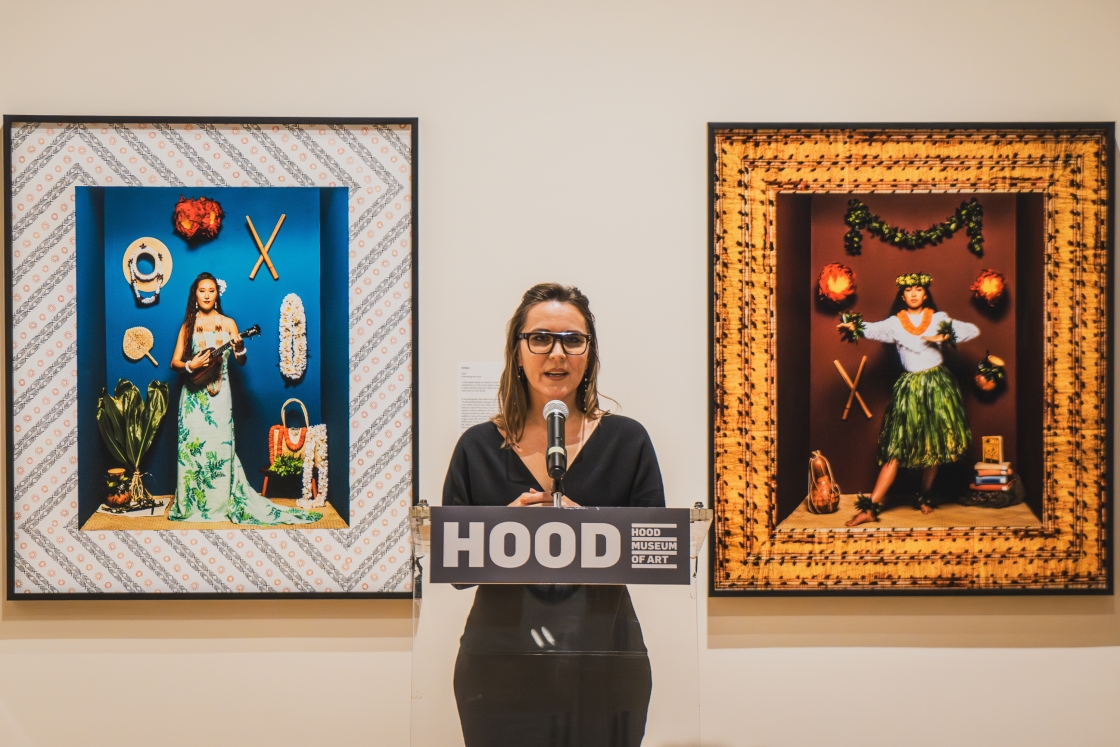Four Dartmouth undergraduates took to the streets of West Lebanon, N.H., last fall to spread the word about the Good Neighbor Health Clinics (GNHC)—free medical and dental resources, based in White River Junction, Vt., for low-income, uninsured or underinsured residents of the Upper Valley.
Drawn from the ranks of Dartmouth’s Nathan Smith Society, Megan Clyne ’19, Dominique Dadekian ’18, Josephina Lin ’19, and Emily Yang ’18 were proposed for this volunteer work by Lee Witters, the Eugene W. Leonard 1921 Professor of Medicine, Medical Education and Biochemistry at the Geisel School of Medicine, and a professor of biological sciences. The four students are also participants in the Dartmouth Health Professions Program.

The Nathan Smith Society, named for the founder of Dartmouth Medical School—now the Geisel School of Medicine— is a century-old Dartmouth organization for students interested in the health professions. Since 1995, Witters has served as the society’s faculty adviser.
“The society has for some time been involved with the GNHC and undertook this project to increase the clinics’ visibility in the Upper Valley, specifically among workers in West Lebanon, to acquaint them with the services of the clinics,” Witters says. “Members of the society reach out in benevolent types of activities, and this particular one was entirely student driven.”
Donald Kollisch, an associate professor of medicine and of community and family medicine at Geisel, and a volunteer at GNHC since 1995, “has been the guiding hand behind this outreach and its intersection with the Nathan Smith Society,” Witters says.
“The clinics’ outreach committee members were thinking about how easy it is for people who might need our services to not even know we exist,” Kollisch says. “We were talking about how we could reach workers in companies that might not offer health insurance—companies that probably don’t pay a whole lot. We were very concerned that many workers in the Upper Valley, on both the New Hampshire and the Vermont sides, who really needed to see a physician didn’t know about the clinics.”
“They didn’t seem to be getting across to this group of individuals, so Don asked me if students could help in publicizing the clinics,” Witters says. “The students I spoke with were more than willing.”
On Nov. 6, the four student volunteers set out on their trek. Their stops included Walmart, Dunkin’ Donuts, Kmart, Payless, KFC, and Michaels, where they distributed printed information about the clinics.
“We went to fast food restaurants and discount stores, places where low-income workers might either be shopping or working themselves,” says Dadekian. “We would go in and ask whether someone could put our flyer up on the employee breakroom bulletin board. It was that simple.”
“Of the 19 stores we visited, all of them accepted our flyers and we had overwhelmingly positive responses from the employees when we spoke about Good Neighbor’s health and dental care,” says Yang. “We met one person in Michaels who told us how happy she was to learn about the clinics because she had not seen a dentist in seven years and was in a lot of pain from multiple cavities. Stories like these encourage us to support an organization like Good Neighbor.”
“The GNHC is gushing about what the students have done for them,” Witters says. “The clinics, which rely entirely on volunteer physicians, nurses, and other medical practitioners, have a long history of student involvement.”
The students also engaged in fundraising on campus for the clinics. “This term our big focus was on getting a fundraiser done,” says Dadekian. “We just did a Valentine’s Day fundraiser where we made about $300 for the clinics by selling carnations, which was huge for us.
“Obviously, what we do is positive for people in the surrounding communities,” she says, “but it can also be an eye-opener for Dartmouth students, raising their awareness of the needs of people beyond Hanover. It can take them outside ‘the bubble,’ enable them to reconnect with the world outside, and even get involved.”
“We want to continue to push the outreach because there are certainly populations around here other than the workers in West Lebanon who need to learn about the clinics,” says Kollisch. “Come summertime, there are a lot of migrant workers here, for example, who may not want to surface because some may be undocumented, yet they need medical care and this would be an ideal place for them to turn. There is a wonderful group of docs and others working down here that could provide for their needs.”
Joseph Blumberg can be reached at joseph.e.blumberg@dartmouth.edu.

